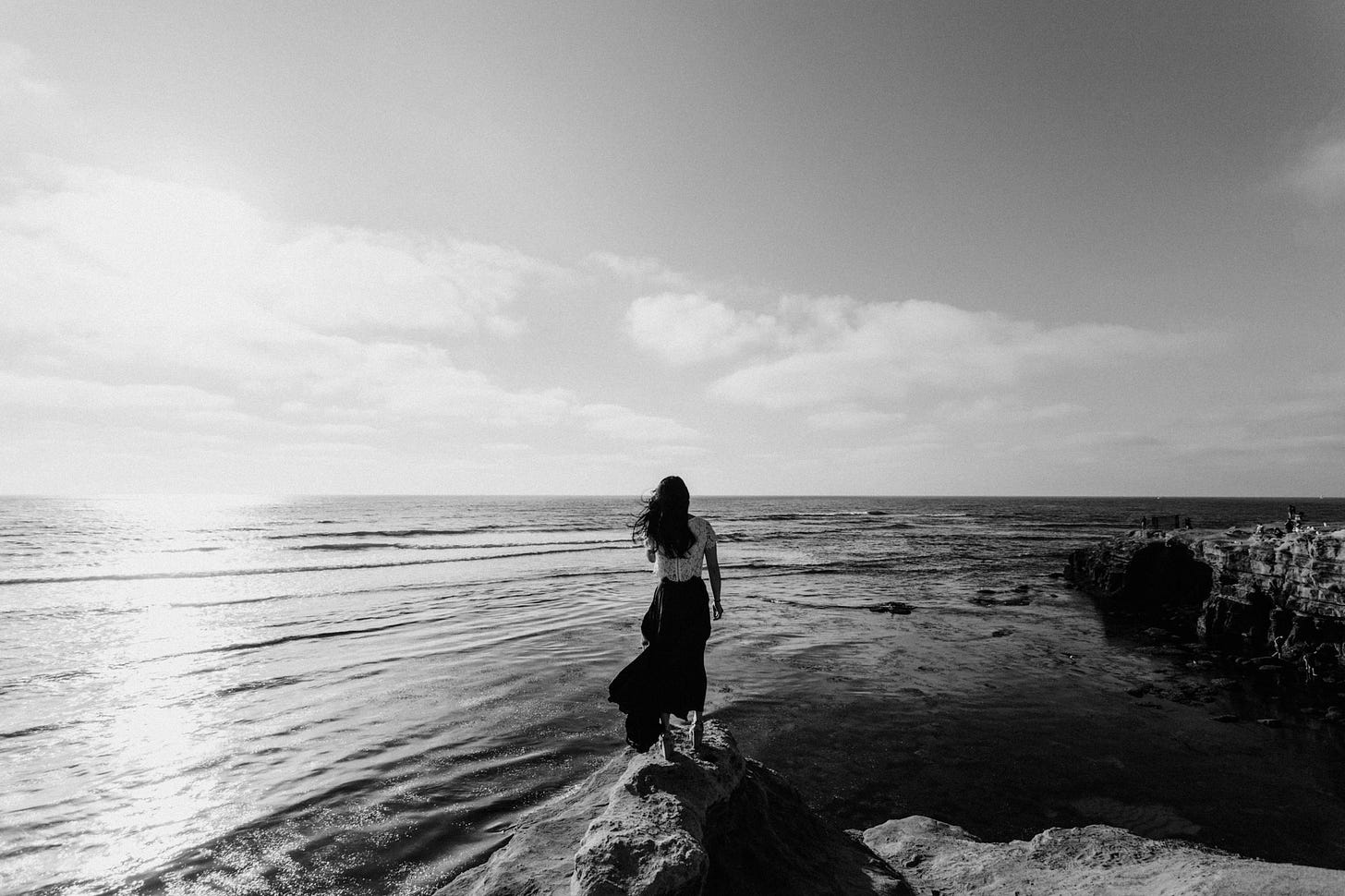Éowyn
A Guest Post by Tiffany Chu
Dear readers:
Today I am pleased to present this guest post by Tiffany Chu, who writes Notes from the Town Hermit. Subscribe to her newsletter for more of her warm, insightful writing.
Yours,
John
[. . .] and behold! the Shadow has departed! I will be a shieldmaiden no longer, nor vie with the great Riders, nor take joy only in the songs of slaying. I will be a healer and love all things that grow and are not barren.
So says Éowyn after accomplishing one of the greatest feats in the War of the Ring: vanquishing the Lord of the Nazgûl. Just chapters before, she had made this epic speech to this foe that cowed even Gandalf and laughed in his face.
But no living man am I!1 You look upon a woman. Éowyn I am, Éomund’s daughter. You stand between me and my lord and kin. Begone, if you be not deathless! For living or dark undead, I will smite you, if you touch him.
Cue the cheering. What a win for feminism and woman’s superiority!
But then, what happens?
She goes and gets married to a man (never mind that it’s to Faramir, arguably the best of them) and swears off battles, Taming of the Shrew-style.
It’s here that some feminist critics throw their hands up in disgust and relegate Tolkien back to the dark box of yet another elitist male author who failed to write a good character arc for a woman.
To have come to such a conclusion, however, would have meant missing who Éowyn is altogether. She is one of the most complex and misunderstood characters in the trilogy.
A morning of pale spring that is not yet come to womanhood
Let us set aside preconceived notions of womanhood for a moment and examine Éowyn‘s character arc.
Éowyn dreams of glory but knows nothing of what it entails. She only knows she has lived trapped within the confines of duty to a king and uncle who will not rule, scrutinized and lusted after by a slimy and treacherous man, living under the shadow of her brother and men she sees riding off to renown and fame, while she is forever left behind to tend the house.
[. . .] but she, born in the body of a maid, had a spirit and courage at least the match of yours. Yet she was doomed to wait upon an old man, whom she loved as a father, and watch him falling into a mean dishonored dotage; and her part seemed to her more ignoble than that of the staff he leaned on.
In Gandalf’s words describing her, we gain insight into what it must have been like to live trapped and helpless in a kingdom falling to ruin.
There is much to be pitied in Éowyn, and much to empathise with. She is a spirited woman who longs for more than what her sex can afford her. There is no honour in looking after her uncle, regardless of affection.
At the same time, Éowyn‘s perspective is limited by her own predetermined ideas of what life should be like for a person of her bearing and lineage. She is repeatedly described as a girl not yet come to womanhood, which is to say, she is still immature. She sees her life as a cage; when Aragorn arrives like a conquering hero out of a legendary history book, she sees a ticket out of her chains, and falls in love, not with Aragorn himself, but with what he can offer her as an escape.
Forsaking duty in pursuit of vain ambition
The turning point comes at Dunharrow, when Aragorn, on the way to the Paths of the Dead, reminds Éowyn of her charge, even as she entreats him to let her accompany him.
Here, the contrast in their perspectives only highlights where Éowyn‘s focus is. She argues against him and quite tellingly, she cannot understand his decision to seek the Paths of the Dead, where he cannot hope to gain glory in the battle at Minas Tirith:
Yet I do not bid you flee from peril, but to ride to battle where your sword may win renown and victory. I would not see a thing that is high and excellent cast away needlessly.
He, on the other hand, reminds her of her responsibilities to her people and the trust Théoden placed in her to lead them to safety. The following is a long excerpt, but bear with me here; this is important.
“Your duty is with your people,” he answered.
“Too often have I heard of duty,” she cried. “But am I not of the House of Eorl, a shieldmaiden and not a dry-nurse? I have waited on faltering feet long enough. Since they falter no longer, it seems, may I not now spend my life as I will?”
“Few may do that with honour,” he answered. “But as for you, lady: did you not accept the charge to govern the people until their lord’s return? If you had not been chosen, then some marshal or captain would have been set in the same place, and he could not ride away from his charge, were he weary of it or no.”
Contrast Aragorn’s rebuke with how he too longs to go elsewhere than where his duty bids: to Rivendell where his heart dwells.
Leadership requires sacrifice.
Éowyn has yet to understand this. When she cannot win Aragorn’s love, she decides she would rather die in a glorious blaze and win a name for herself while she’s at it. She disguises herself and goes to battle.
She abandons her people.
When Éowyn grows up and learns true strength
We’ve now come full circle. The Witchking is defeated at Éowyn‘s hand; she has won the renown she sought, and yet it is not enough because she didn’t get to die in battle and she still doesn’t have the love of Aragorn.
In the Houses of Healing, she convalesces along with Faramir, and to him she confides the pain of her heart in a way that is both tender and endearing. It’s one of the rare instances we witness Éowyn‘s vulnerability as she tells him how her window doesn’t face eastward.
Éowyn sees in Faramir a man who is no less valiant than anyone in Rohan, yet doesn’t love war. As they heal in body and spirit, they grow to understand one another. Like Aragorn, Faramir is also moved to pity toward Éowyn, but he comes to love her for who she is. He recognises her courage and also her innocence in a way even her brother did not, and echoes back to her the words she has kept hidden in her own heart.
Faramir doesn’t talk down at her the way Aragorn and others did, however correct they may have been. He acknowledges her; he sees her.
Then the heart of Éowyn changed, or else at last she understood it.
In being seen, Éowyn is transformed.
I want to linger here for a moment.
Because I don’t think it’s an accident that Éowyn‘s transformation comes immediately after Faramir’s mini-analysis of her character. When she realises that he understands and recognises her for who she is, she is no longer compelled to prove herself and her worth through fighting; she now possesses the freedom to be who she is, completely.
It’s too easy to see Éowyn as a fierce woman who settles down to domesticity for a man, but much more is at play here. Faramir’s famous line goes, “I do not love the bright sword for its sharpness, nor the arrow for its swiftness, nor the warrior for his glory. I love only that which they defend.” He exudes this in his bearing, and Éowyn senses it.
Until this point, the sword is a mere means to an end for Éowyn; her deepening bond with Faramir shows her there is meaning to be found in life rather than death. We see a vital shift from literal death to life, both in Éowyn‘s will to live and her motivation for living.
This, then, brings us back to my opening quote: “[. . .] and behold! the Shadow has departed! I will be a shieldmaiden no longer, nor vie with the great Riders, nor take joy only in the songs of slaying. I will be a healer and love all things that grow and are not barren.”
Rather than seeking war and death, Éowyn now chooses to cultivate life instead. Her journey of self-discovery led her through dark paths, a loss of meaning, and ultimately to a new sense of purpose.
A few things stand out to me as I bring this to a close:
Éowyn’s decision to nurture life with her hands ties well with Tolkien’s larger themes. We see this in the Hobbits, but most of all in the character of Sam, who, when imagining what he would do with the Ring, dreams of a giant garden.
I’m also struck by the fact that once again, heroism in Tolkien’s story does not present the way it conventionally would in such stories, or in the way Éowyn understood heroism at the start of her journey.
She learns that it does not have to take her skill with a sword to make her a strong woman.
Rather, true strength is found in sacrifice, understanding, and a deep respect for living things. After the devastation of war and a brush with death, Éowyn returns to life and devotes her efforts to restoring a fractured land. She learns what true heroism means: not in the pursuit of acclaim but in the less glamorous yet no less worthy pursuit of healing what is broken.
Nazguls were clearly unfamiliar with Macbeth-type prophetic loopholes. Considering how disappointed Tolkien was by the trees in Macbeth, this is all the more fun to think about. It makes for great literature that the aspect that kept Eowyn trapped and underestimated by all around her turns out to be the very thing that allows her to defeat one of the book’s most terrible creatures.
Of course, the argument has also been made that “no living man” could refer to Merry, who is also not a Man stabbing the Nazgul lord, “cleaving the undead flesh” from immortality, and not to Éowyn. That’s a minor point, in my opinion. Rather, the fact that it took both Merry and Éowyn to vanquish this foe falls right in line with Tolkien’s themes: that it takes separate parts working together to bring victory, and it often comes from those society overlooks.






Great stuff! Loved this whole essay but the piece that spoke to me most was the part about being seen and then flourishing. It is amazing how impactful it is when we are truly seen by someone. It enables us to BECOME. Thank you for this.
Fantastic essay! Thank you for sharing this, John. I always enjoyed the similarities of her journey with Samwise, another individual constrained by their station. Yet, both found ways to work together in pairs to overcome a great evil and spend their days repairing the land and people.